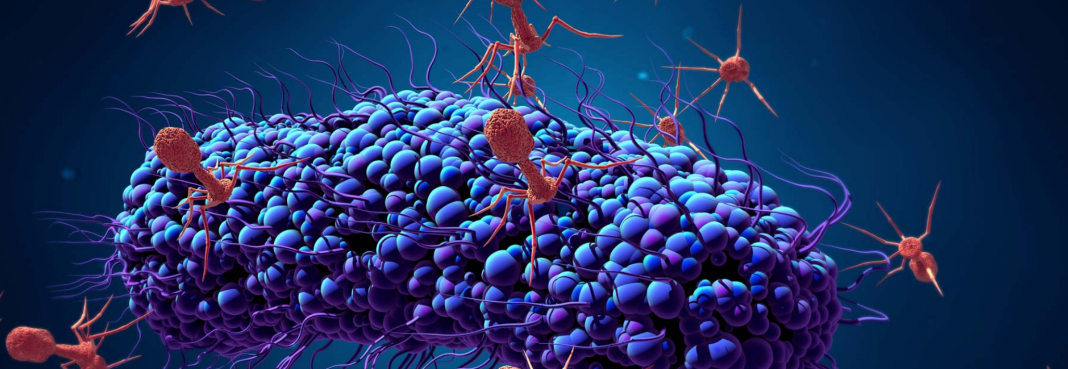Given the increasing threat of antimicrobial resistance, Gunther Vanwezer, CEO of Vésale Bioscience, explains how bacteriophages offer a promising natural solution and outlines the company’s efforts to become a pioneer in the development of innovative, personalised and sustainable phage-based therapy solutions
Antimicrobial resistance (AMR) is a major problem and an enormous public health challenge. According to the World Health Organization (WHO), AMR is one of the top ten global threats to public health. The projections are deeply concerning; AMR, often referred to as the “silent pandemic”, is responsible for approximately 1.3 million deaths worldwide annually, with an alarming possibility of escalating to ten million deaths by 2050.
The exponential growth of resistance to various antimicrobial products adds to the gravity of the situation. The effectiveness of treatments for bacterial infections is becoming increasingly problematic, and the search for new antibiotics is facing a significant decline.
Bacteriophages appear to be the most promising natural solution in this worrying situation. Voted Europe’s most innovative life sciences start-up in 2021, Vésale Bioscience is committed to developing personalised phage-based therapies to combat multi-resistant bacterial infections. In January 2023, the European Innovation Council (EIC) awarded it 1.8 million euros to encourage its research.
The power of bacteriophages
Bacteriophages, also known as phages, are what we call “good” viruses that heal by infecting pathogenic bacteria in a specific way. These natural viruses have evolved in symbiosis with bacteria over time, contributing to their long-lasting efficacy. Moreover, unlike antibiotics, phages only target a specific spectrum of bacterial strains.
This makes bacteriophages ideally suited to precision medicine, continuing to work where current antibiotics and antimicrobials fail. Personalised phage therapy is proving to be an effective therapeutic strategy for treating antimicrobial resistance and difficult-to-treat infections.
Vésale Bioscience’s scalable personalised phage therapy
Vésale Bioscience has introduced a pioneering personalized phage therapy platform that delivers tailored treatment for individual bacterial infections within a rapid timeframe of less than 24 hours. This innovative platform is designed to address a patient’s specific bacterial infection with precision and efficiency. The first phase will be initiated in Europe in early 2025, and the second in the United States, Asia, and the Middle East.
Vésale Bioscience’s approach is based on four key pillars: an extensive phage library, a patented phagogram, flexible GMP facilities and a fast, efficient, and integrated supply chain.
A. An ever-evolving phage collection
- Vésale Bioscience’s phage library currently encompasses a diverse and significant spectrum, targeting multi-resistant ESKP* strains in Western Europe. This extensive coverage is established in collaboration with several key European hospitals covering the majority of European multi-resistant strains. We have ambitious plans to expand our coverage to encompass the entire fleet of ESKAPEE** pathogens in the coming years.
B. The first on-site, automated phagogram
- Accessible to all hospital laboratories with standard equipment on their premises, this automated, easy-to-use device makes it possible to assess the sensitivity of bacteria to phages, thus facilitating the selection of the most appropriate treatment for the patient.
C. Phage production in compliance with Good Manufacturing Practices
- Vésale Bioscience then produces the selected phages in compliance with Good Manufacturing Practices (GMP) from a constantly expanding phage bank.
D. A fast, efficient, and integrated supply chain to deliver standardized phages for personalized therapy
- Vésale Bioscience will distribute, at launch foreseen in early 2025, a range of therapeutic phages, provide standard protocols for different indications, and rapidly enable treatment to be tailored to individual patient needs.
- These formulations could be used with antibiotics for an effective combined treatment. Phage products for compounding will made available within 24 hours to all major hospitals in Europe. A streamlined and expedient supply chain will be established to provide distinct phage therapy solutions, each precisely tailored to address specific indications.
A global, visionary approach
Vésale Bioscience’s ambition is to become the European leader in personalised phage therapy by developing and marketing a first-rate phagogram and phages that comply with GMP rules. The company has forged strategic partnerships with university researchers, KOLs (Key Opinion Leaders), hospitals, reference centres and industry to achieve this goal. The aim is also to make these therapies accessible to all patients, improving their health and quality of life.
Potential for bacteriophages in Vésale Bioscience
Antimicrobial resistance is a growing threat to public health. Bacteriophages offer a promising natural solution to this problem. Vésale Bioscience, with its scalable personalised phage therapy, is a pioneer in developing innovative, personalised, and sustainable solutions for treating multi-resistant bacterial infections.
Vésale Bioscience, therefore, aims to become the reference in phage therapy, helping to solve the global antimicrobial resistance crisis and improve patient health.
- (*) Escherichia coli – Staphylococcus aureus – Klebsiella pneumoniae – Pseudomonas aeruginosa
- (**) Escherichia coli – Staphylococcus aureus – Klebsiella pneumoniae – Pseudomonas aeruginosa – Cinetobacter baumanii – Enterococcus fecalis faecium – Enterobacter

This work is licensed under Creative Commons Attribution-NonCommercial-NoDerivatives 4.0 International.


